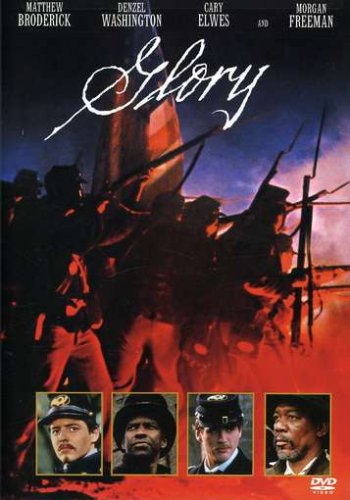 |
| (en.wikipedia.org) |
Glory (1989)
This film is about an African-American who is a Col. and gets the chance to become command of the United States' very first African-American regiment. The film is about the Civil War and it gives an interesting representation of race in the 1980s. https://www.youtube.com/watch?v=KD5DVxqmjRo&list=PLPLXWTbIEGFTYf77ta3BjcCcmSF-gIONMQz&feature=iv&src_vid=gmo_PhSftuc&annotation_id=annotation_64357
This clip demonstrates how African Americans were treated by other races. What is interesting is that despite the African-American getting whipped, one white man within the clip believes that the African-American should not be whipped, but perhaps something less humiliating. This indicates that during the 1980s, people's attitudes towards African-Americans were changing, and they did not want to treat them any differently to their own race. At the same time, the main man in charge goes ahead with the whipping, although his facial expressions suggest that he did not want to, but felt that he had to. The man whipping, represents the people in the United States whose attitudes had not changed a lot during the 1980s.
Black America in the 1980s: Theoretical and practical implication by Graham C. Kinloch
This journal relates to the film Glory as well as American culture in the 1980s. It examines whether the representation of race within the United States has actually improved, become worse or whether it has remained the same. It highlights that although there has been some progress, there is still African-American deprivation. It suggests that this is because of the white race consistently being prejudice and self-interested. This, as a result, is why the negative status of African-Americans has remained during the 1980s.
Yuppie Racism: Race Relations in the 1980s by Richard Lowy
This journal article also relates to the film Glory as well as to American culture of the 1980s. It describes the representation of race in the United States as being negative, and not having a good image of African-Americans during the 1980s, despite the civil rights act 20 years earlier. It comments that racial violence in on the rise and that a lot of racial incidents happened during the 1980s. This indicates that the representation of race in the 1980s was not positive, and people's attitudes has remained the same from previous years.
 |
| (www.amazon.com) |
 |
| (www.rogerebert.com) |
These two film covers are from the same film but from different years. It demonstrates how the representation of race is viewed differently in different decades. The image on the right is the least recent film cover, and this suggests that the representation of race within the United States had not changed that much from previous decades. Although on this particular film cover, there are the faces of the main characters, the main image is of soldiers whose faces are not recognisable. This provides viewers with the ability to decide for themselves what race the soldiers are, and could also be seen as an attempt of a bad representation of race within the United States during the 1980s.
Although, on the other hand, this image suggests that your race does not matter when fighting, what matters is that you are all fighting for the same country; the United States. This is shown through the American flag at the top of the cover, and the soldiers fighting beneath it. Therefore, this indicates that the image on the right is a good representation of race in the United States during the 1980s, whereas the image on the left is not. This is because the most recent film cover, suggests that race does matter, as the image shows different races.
The one of the left is a more recent cover, of the 1989 film. This has the African-Americans in the centre of the image, alongside the white man. This indicates that there has been progress in regard to race, because unlike the 1989 version, the two races have equal representation on the front of the cover. This also illustrates that many attitudes have changed from the 1980s, and as a result, the representation of African-Americans has improved over the years.
Grace La Traille
Sources: https://www.google.co.uk/search?q=glory+1989&biw=1366&bih=673&source=lnms&tbm=isch&sa=X&ved=0ahUKEwja3L2m387KAhVC1xoKHbRNDH0Q_AUIBygC#imgrc=Eqv56xQ0FRbrYM%3A
http://www.imdb.com/title/tt0097441/
http://www.jstor.org/stable/23262550?Search=yes&resultItemClick=true&searchText=the&searchText=representation&searchText=of&searchText=race&searchText=in&searchText=1980s&searchText=american&searchText=culture&searchUri=%2Faction%2FdoBasicSearch%3FQuery%3Dthe%2Brepresentation%2Bof%2Brace%2Bin%2B1980s%2Bamerican%2Bculture%26amp%3Bprq%3Dthe%2Brepresentation%2Bof%2Brace%2Bin%2B1980s%2Bamerica%26amp%3Bgroup%3Dnone%26amp%3Bhp%3D25%26amp%3Bso%3Drel%26amp%3Bfc%3Doff%26amp%3Bacc%3Don%26amp%3Bwc%3Don&seq=18#page_scan_tab_contents
http://www.jstor.org/stable/23262550?Search=yes&resultItemClick=true&searchText=the&searchText=representation&searchText=of&searchText=race&searchText=in&searchText=1980s&searchText=american&searchText=culture&searchUri=%2Faction%2FdoBasicSearch%3FQuery%3Dthe%2Brepresentation%2Bof%2Brace%2Bin%2B1980s%2Bamerican%2Bculture%26amp%3Bprq%3Dthe%2Brepresentation%2Bof%2Brace%2Bin%2B1980s%2Bamerica%26amp%3Bgroup%3Dnone%26amp%3Bhp%3D25%26amp%3Bso%3Drel%26amp%3Bfc%3Doff%26amp%3Bacc%3Don%26amp%3Bwc%3Don&seq=1#page_scan_tab_contents
http://www.jstor.org/stable/2784688?Search=yes&resultItemClick=true&searchText=the&searchText=representation&searchText=of&searchText=race&searchText=in&searchText=1980s&searchText=american&searchText=culture&searchUri=%2Faction%2FdoBasicResults%3FQuery%3Dthe%2Brepresentation%2Bof%2Brace%2Bin%2B1980s%2Bamerican%2Bculture%26amp%3Bprq%3Dthe%2Brepresentation%2Bof%2Brace%2Bin%2B1980s%2Bamerica%26amp%3Bgroup%3Dnone%26amp%3Bhp%3D25%26amp%3Bfc%3Doff%26amp%3Bacc%3Don%26amp%3Bwc%3Don%26amp%3Bvf%3Dall%26amp%3Bso%3Drel%26amp%3Bsi%3D1&seq=2#page_scan_tab_contents
http://www.jstor.org/stable/2784688?Search=yes&resultItemClick=true&searchText=the&searchText=representation&searchText=of&searchText=race&searchText=in&searchText=1980s&searchText=american&searchText=culture&searchUri=%2Faction%2FdoBasicResults%3FQuery%3Dthe%2Brepresentation%2Bof%2Brace%2Bin%2B1980s%2Bamerican%2Bculture%26amp%3Bprq%3Dthe%2Brepresentation%2Bof%2Brace%2Bin%2B1980s%2Bamerica%26amp%3Bgroup%3Dnone%26amp%3Bhp%3D25%26amp%3Bfc%3Doff%26amp%3Bacc%3Don%26amp%3Bwc%3Don%26amp%3Bvf%3Dall%26amp%3Bso%3Drel%26amp%3Bsi%3D1&seq=1#page_scan_tab_contents
https://www.google.co.uk/search?q=glory+film+cover+1989+vs+recent&biw=1366&bih=673&source=lnms&tbm=isch&sa=X&ved=0ahUKEwjwh4Cb6s7KAhWHeCYKHUnYBS0Q_AUIBigB#imgrc=frmcgSuh-RAxiM%3A
https://www.google.co.uk/search?q=glory+film+cover+1989+vs+recent&biw=1366&bih=673&source=lnms&tbm=isch&sa=X&ved=0ahUKEwjwh4Cb6s7KAhWHeCYKHUnYBS0Q_AUIBigB#imgdii=frmcgSuh-RAxiM%3A%3BfrmcgSuh-RAxiM%3A%3B91WVvm3ULQojNM%3A&imgrc=frmcgSuh-RAxiM%3A















